Unit 5 Topic 1 I usually come to school by subway. Section D 课件 +嵌入音频(共17张PPT)
文档属性
| 名称 | Unit 5 Topic 1 I usually come to school by subway. Section D 课件 +嵌入音频(共17张PPT) | 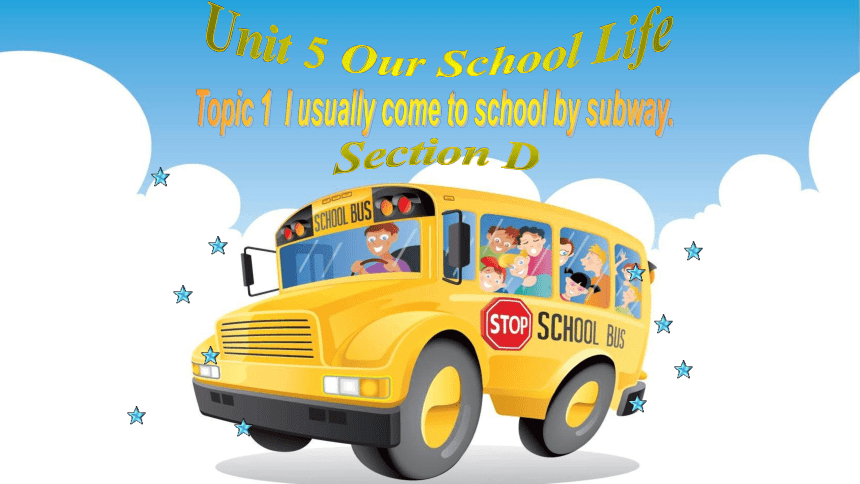 | |
| 格式 | pptx | ||
| 文件大小 | 4.3MB | ||
| 资源类型 | 教案 | ||
| 版本资源 | 仁爱科普版 | ||
| 科目 | 英语 | ||
| 更新时间 | 2022-02-19 13:30:34 | ||
图片预览

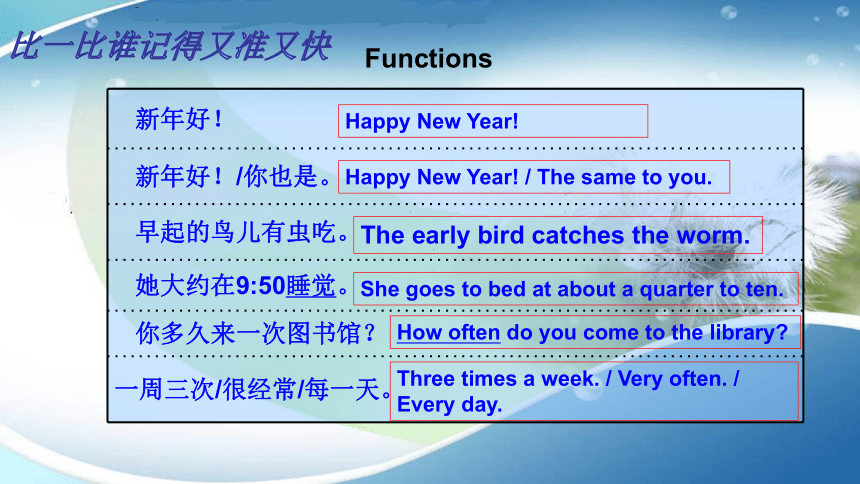
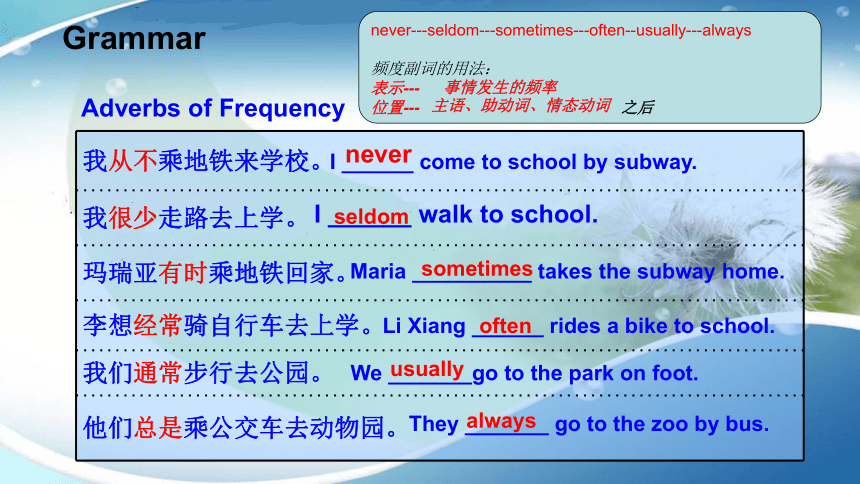
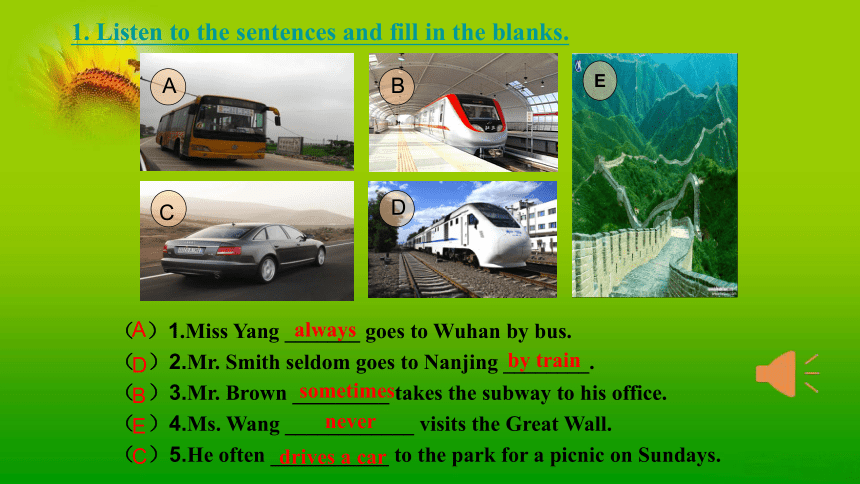
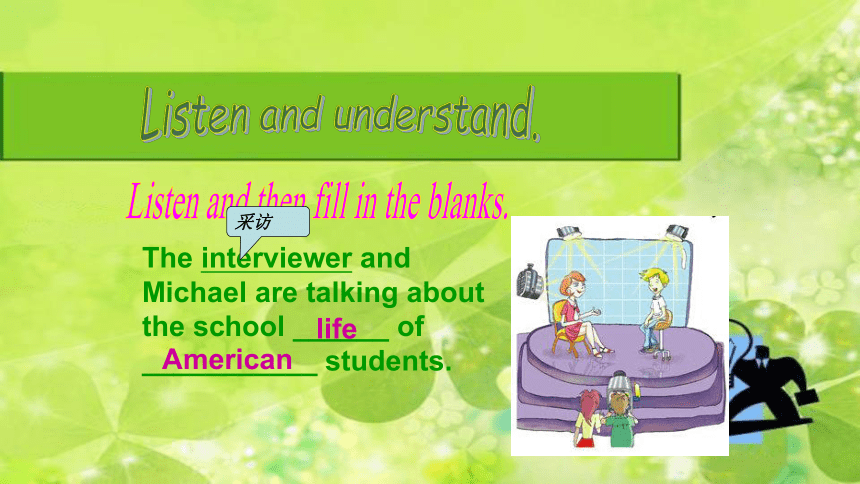
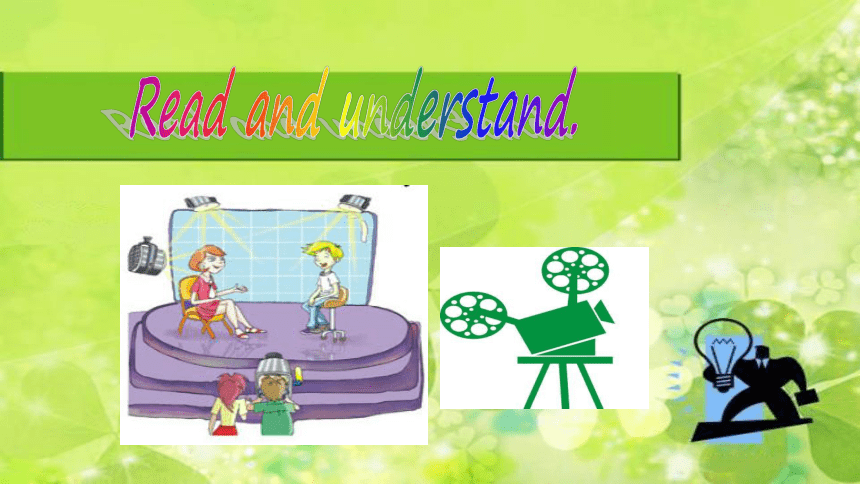
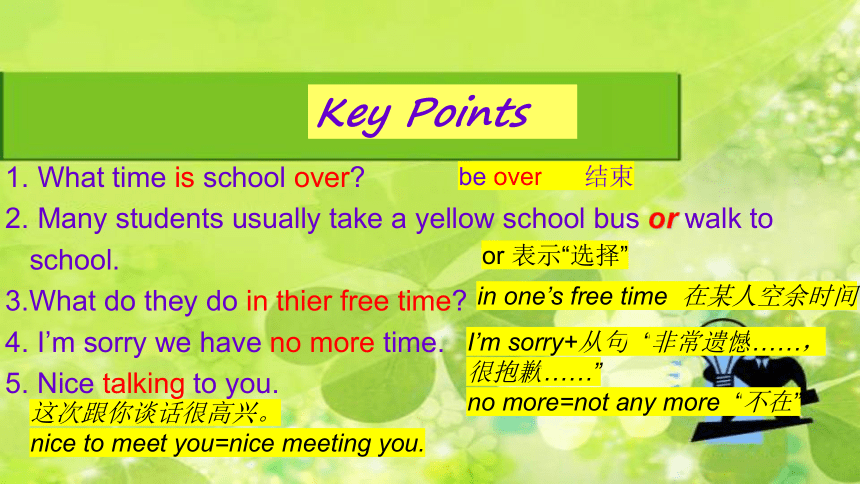
文档简介
(共17张PPT)
Unit 5 Our School Life
Section D
Topic 1 I usually come to school by subway.
Functions
新年好!
新年好!/你也是。
早起的鸟儿有虫吃。
她大约在9:50睡觉。
你多久来一次图书馆?
一周三次/很经常/每一天。
Happy New Year!
Happy New Year! / The same to you.
The early bird catches the worm.
She goes to bed at about a quarter to ten.
How often do you come to the library
Three times a week. / Very often. / Every day.
比一比谁记得又准又快
Grammar
我从不乘地铁来学校。
我很少走路去上学。
玛瑞亚有时乘地铁回家。
李想经常骑自行车去上学。
我们通常步行去公园。
他们总是乘公交车去动物园。
Adverbs of Frequency
I ______ come to school by subway.
never
你还记得学过的频度副词吗?
never---seldom---sometimes---often--usually---always
I ______ walk to school.
seldom
Maria __________ takes the subway home.
sometimes
Li Xiang ______ rides a bike to school.
often
We _______go to the park on foot.
usually
They _______ go to the zoo by bus.
always
never---seldom---sometimes---often--usually---always
频度副词的用法:
表示---
位置--- 之后
主语、助动词、情态动词
事情发生的频率
( )1.Miss Yang _______ goes to Wuhan by bus.
( )2.Mr. Smith seldom goes to Nanjing ________.
( )3.Mr. Brown _________ takes the subway to his office.
( )4.Ms. Wang ____________ visits the Great Wall.
( )5.He often ___________ to the park for a picnic on Sundays.
always
never
by train
sometimes
drives a car
1. Listen to the sentences and fill in the blanks.
C
D
A
C
E
D
B
A
B
E
E
The interviewer and Michael are talking about the school ______ of ___________ students.
Listen and then fill in the blanks.
Listen and understand.
life
American
采访
Read and understand.
Key Points
What time is school over
Many students usually take a yellow school bus or walk to school.
3.What do they do in thier free time
4. I’m sorry we have no more time.
5. Nice talking to you.
in one’s free time 在某人空余时间
be over 结束
I’m sorry+从句 “非常遗憾……,很抱歉……”
no more=not any more “不在”
这次跟你谈话很高兴。
nice to meet you=nice meeting you.
or 表示“选择”
How do American students usually go to school
2. Where do the students usually have lunch
3. What time is school over
4. What do they do after school
They usually take a yellow school bus or walk to school.
They usually have lunch at school.
At about 3 o’clock.
They often play basketball and soccer.
2. Read the interview again and answer
the questions. Then act it out.
Act out
key words
new friend, Michael, school life of American students, take a yellow school bus or walk, have lunch, begin class, in their free time, play basketball and soccer
1.--______ do you usually go to the library
--I often ______ to the library.
A . How ;by bus B.How often;take a bus
C.How;take a bus D.How often;on a bus
2.--_____ is the Olympics(奥林匹克) held(举办)
--Every four years.
A.How often B.How long C.When D.How soon
3.Amy ____ walks to school.She always goes to school by subway.
A.always B.sometimes C.often D.never
4.--Kate,can you play____ basketball
--Yes,but I don’t have ___ basketball.
A./;the B./;a C.the;an D.a;the
Exercise
C
A
D
B
1. Survey your classmates about their school life.
Item Name How to go to school Where to have lunch When to leave school What to do after school How often does she/he …?
Li Wei
…
Project
2. Compare(比较) the school life of American students with yours and report it to the class.
Chinese Students American Students
2. Compare the school life of American students with yours and report it to the class.
You may begin like this:
The school life of American students is different from ours …
3. Write a passage. You may use the expressions in Functions if necessary.
You may begin like this:
The school life of American students is different from ours …
Summary
We learn: 1. some words: great, wall, life, American,
over, more, talk
2. some phrases: the Great Wall, have lunch,
in the free time/in one’s free time
3. some sentences:
I’m sorry we have no more time.
Nice talking to you.
We can: talk about the difference between the school
life of American students and that of Chinese
students.
Homework
1. 过关 单词、Grammar、Functions、2。
2. 会默写 单词、Grammar、Functions、
3. 完成同步练习册
Thank you
Unit 5 Our School Life
Section D
Topic 1 I usually come to school by subway.
Functions
新年好!
新年好!/你也是。
早起的鸟儿有虫吃。
她大约在9:50睡觉。
你多久来一次图书馆?
一周三次/很经常/每一天。
Happy New Year!
Happy New Year! / The same to you.
The early bird catches the worm.
She goes to bed at about a quarter to ten.
How often do you come to the library
Three times a week. / Very often. / Every day.
比一比谁记得又准又快
Grammar
我从不乘地铁来学校。
我很少走路去上学。
玛瑞亚有时乘地铁回家。
李想经常骑自行车去上学。
我们通常步行去公园。
他们总是乘公交车去动物园。
Adverbs of Frequency
I ______ come to school by subway.
never
你还记得学过的频度副词吗?
never---seldom---sometimes---often--usually---always
I ______ walk to school.
seldom
Maria __________ takes the subway home.
sometimes
Li Xiang ______ rides a bike to school.
often
We _______go to the park on foot.
usually
They _______ go to the zoo by bus.
always
never---seldom---sometimes---often--usually---always
频度副词的用法:
表示---
位置--- 之后
主语、助动词、情态动词
事情发生的频率
( )1.Miss Yang _______ goes to Wuhan by bus.
( )2.Mr. Smith seldom goes to Nanjing ________.
( )3.Mr. Brown _________ takes the subway to his office.
( )4.Ms. Wang ____________ visits the Great Wall.
( )5.He often ___________ to the park for a picnic on Sundays.
always
never
by train
sometimes
drives a car
1. Listen to the sentences and fill in the blanks.
C
D
A
C
E
D
B
A
B
E
E
The interviewer and Michael are talking about the school ______ of ___________ students.
Listen and then fill in the blanks.
Listen and understand.
life
American
采访
Read and understand.
Key Points
What time is school over
Many students usually take a yellow school bus or walk to school.
3.What do they do in thier free time
4. I’m sorry we have no more time.
5. Nice talking to you.
in one’s free time 在某人空余时间
be over 结束
I’m sorry+从句 “非常遗憾……,很抱歉……”
no more=not any more “不在”
这次跟你谈话很高兴。
nice to meet you=nice meeting you.
or 表示“选择”
How do American students usually go to school
2. Where do the students usually have lunch
3. What time is school over
4. What do they do after school
They usually take a yellow school bus or walk to school.
They usually have lunch at school.
At about 3 o’clock.
They often play basketball and soccer.
2. Read the interview again and answer
the questions. Then act it out.
Act out
key words
new friend, Michael, school life of American students, take a yellow school bus or walk, have lunch, begin class, in their free time, play basketball and soccer
1.--______ do you usually go to the library
--I often ______ to the library.
A . How ;by bus B.How often;take a bus
C.How;take a bus D.How often;on a bus
2.--_____ is the Olympics(奥林匹克) held(举办)
--Every four years.
A.How often B.How long C.When D.How soon
3.Amy ____ walks to school.She always goes to school by subway.
A.always B.sometimes C.often D.never
4.--Kate,can you play____ basketball
--Yes,but I don’t have ___ basketball.
A./;the B./;a C.the;an D.a;the
Exercise
C
A
D
B
1. Survey your classmates about their school life.
Item Name How to go to school Where to have lunch When to leave school What to do after school How often does she/he …?
Li Wei
…
Project
2. Compare(比较) the school life of American students with yours and report it to the class.
Chinese Students American Students
2. Compare the school life of American students with yours and report it to the class.
You may begin like this:
The school life of American students is different from ours …
3. Write a passage. You may use the expressions in Functions if necessary.
You may begin like this:
The school life of American students is different from ours …
Summary
We learn: 1. some words: great, wall, life, American,
over, more, talk
2. some phrases: the Great Wall, have lunch,
in the free time/in one’s free time
3. some sentences:
I’m sorry we have no more time.
Nice talking to you.
We can: talk about the difference between the school
life of American students and that of Chinese
students.
Homework
1. 过关 单词、Grammar、Functions、2。
2. 会默写 单词、Grammar、Functions、
3. 完成同步练习册
Thank you
同课章节目录
- Unit 5 Our school life
- Topic 1 I usually come to school by subway.
- Topic 2 A few students are running around the play
- Topic 3 My school life is very interesting.
- Unit 6 Our local area
- Topic 1 Is there a computer in your study?
- Topic 2 My home is in an apartment building.
- Topic 3 Which is the way to the hospital?
- Review of Units 5-6
- Unit 7 The Birthday
- Topic 1 When is your birthday?
- Topic 2 Can you sing an English song?
- Topic 3 Everyone had a good time.
- Unit 8 The seasons and the Weathe
- Topic 1 What's the weather like in summer?
- Topic 2 The summer holidays are coming.
- Topic 3 Let’s celebrate!
- Review of Units 7-8
- 旧版资料
- Unit 5 Our School Life
- Unit 6 Our Local Area
- Unit 7 The Birthday
- Unit 8 The seasons and the Weathe
- Unit 7 Celebrating the Birthday(老版本)
